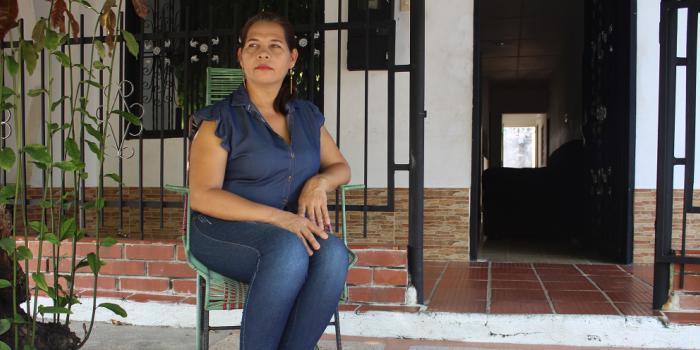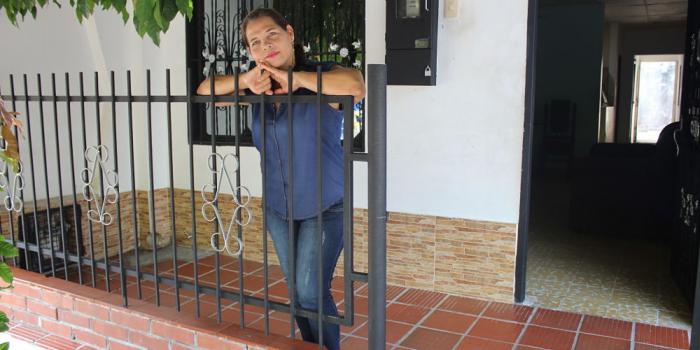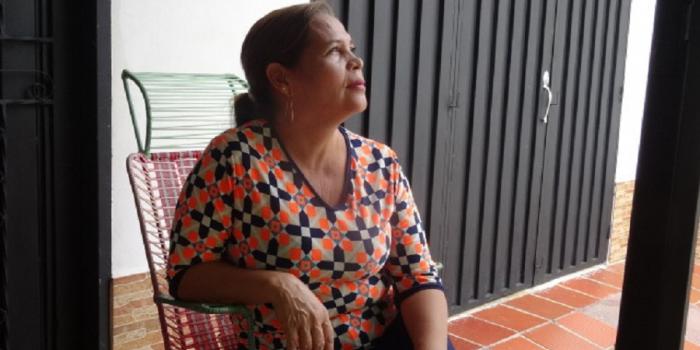
The forgotten massacre of Barrancabermeja
On February 28, 1999, the paramilitary groups of Santander and South of Cesar (Ausac) murdered eight people and disappeared two others in several neighborhoods of the city.



By Erick González G.
"Please do not kill my mother, you already killed my dad," implored desperate Orlando, the 10-year-old son, grabbed the shirt collar of the man who was pointing at his mother's face with a black weapon, overwhelmed. An image that Rubi Vélez will never forget, for the few centimeters that she was of her death penalty. Orlando's pleas rescued her from the scaffold, after she saved him by grabbing his shirt so he would not get between the infamous trigger and her husband, Orlando Forero Tarazona, who was unceremoniously shot several times in front of his two sons and his wife.
Thus, began the bloody running of paramilitaries group who plundered forever the joy of 12 Barrancabermeja families, on February 28, 1999, and which looked like a photocopy of La Chinita massacre, which occurred five years earlier in Apartadó, only that this time perpetrators were not guerrillas. In '94 it was done in the middle of a festival to collect funds, started on Saturday and ended on Sunday, with 35 deceased; in the 99 there were eight dead, two missing and two survivors. Both were preceded by a rumor that something gloomy lurked.
In Barranca, in its southeastern zone, a massacre had already occurred on May 16, 1998, with 32 victims. That fact caused the February 28 to go from a rumor without an expiration date to an announced massacre.
"A bazaar was made to collect funds to pave a street in the neighborhood. The main roads were closed, and for that permission was requested to the Mayor's Office. The event began on Saturday, at 10:00 a.m., and continued on Sunday. That day there was a bike ride, and the sound was lit at 7:00 a.m. ", says Rubi.
From the party to terror
Her family's house was in Provivienda neighborhood, on 52nd Avenue with Carrera 39, northeast of the city. It was the house of her husband's parents and it was in a corner, where the road was closed. Rubi and her husband were enjoying on the platform of the house, watching their children Orlando, who was about 11 years old, and Ánderson, 4, who played on the bike path, and the cultural events that took place on the stage of the bazaar: dance and vallenato groups, especially. From there they also saw the neighborhood school, about 100 meters away.
"Around 5:00 or 5:30 in the afternoon we saw two four-door vans that arrived and stopped at the front of the school, from which 15 to 18 men got off, started to knock down the bikes that for the amount of people they had been parked", said Rubi.
People started running in terror. Orlando and Anderson were riding a bike near where the vans were parked, when the shots started. Rubi and her husband were left in check: all that was left to do was to wait for their children to come up by themselves in their arms to avoid the mate. The seconds passed in slow motion. It is unthinkable to go into the house to safeguard yourself from that corridor of death without them.
"When my children arrived where we were, the 'paramilitaries' were already in front of us. They said: stay there, and our neighbor Pedro Vicente Palacios, nervous, entered my house to lock himself up, and for that reason he was shot twice in the arm, but they did not finish him because he threw himself to the floor, and maybe they thought he was already dead. Because of the noise of those bullets, my husband turned to look at a man who was in front of him, who without thinking he began shooting at him, and my oldest son began to shout: not my dad, not my dad.
Rubi was afraid to move. She only clung to her eldest son, who wanted to offer himself as a shield, but she knew that her generous intention was not bulletproof, and even more so that this kind of criminality was proof against tears and compassion. Elio Mejía, a neighbor, began shouting that they would not kill Orlando, and that daring paid for it with a bullet in the stomach. Orlando was the first dead and Elio the second. From there they went to Versalles neighborhood, where they murdered Israel Ariza, a fried food merchant. Then the armed group went to the Yacht Club of Ecopetrol, in which they killed a taxi driver and a lottery vendor, and on their death journey through another sector they killed two merchants and the manager of a banking entity, and they took a young man and a taxi driver who never appeared again.
For that weekend, her husband had taken all the steps to travel from the farm where he worked to join his family, but life wanted him to miss the main one: the divine one. "He was on a farm of ours, where we grew banana, and he came to Barranca to see his children, that the following monday they were going to enter their first day of high school and kindergarten".
Because of the memories, Rubi's tears fell, especially from the post-traumatic suffering they have experienced. "My children and I were hurt psychologically, especially the older one, who sees a gun and begins to tremble. It was very difficult to keep going: I would wake up screaming at night. " She had to wear her husband's overalls. She put herself in front of the farm, but she had to leave it after being kidnapped along with some relatives of the February 28 massacre.
They took her with Lucía Mejía, sister of Helio Mejía; Paola Galvis, wife of Leonardo Guzman, deputy manager of a bank; Pedro Vicente Palacios, the survivor who received the bullets in his arm, and Ligia Ramírez, whose husband, originally from Chocó and merchant, was murdered last, in a sector near the Rancho El Rancho, on the road to Llanito.
"They located us so that we could give a testimony in favor of Fremio Sánchez, involved in the massacre of May 16, 1998 and that of February 28, 1999, so that they could get him out of jail. They cited us in Miraflores neighborhood in a field, and there they boarded us in taxis and took us to Punta del Palo, in Miraflores, to a house, next to a swamp, where they forced us to testify with false testimonies, because if not they would killed us".
After that, Rubí specialized in various trades-secretary assistant, custodian and politician. Her farm is still abandoned, she has not been able to work because she needs money to plant. In total she has three children: Orlando is an occupational health technologist; Ánderson, environmental engineer, and Andrés Felipe, the youngest, graduates this year from high school and wants to study electronic engineering. "My children have liked studying, because I have taught them that the only thing that is left to one is knowledge."
Today, the Victims Unit will accompany Rubi and the other victims of February 28 massacre in commemoration of this tragedy. "With this commemoration I expect the support of the entities," she says. She is not the only one who hopes they will not forget her. It was long time since the paramilitaries turned the region into a blood refinery, and it is time for them to also learn that, in addition to knowledge, a friendly hand can overcome that situations that life sometimes imposes.






